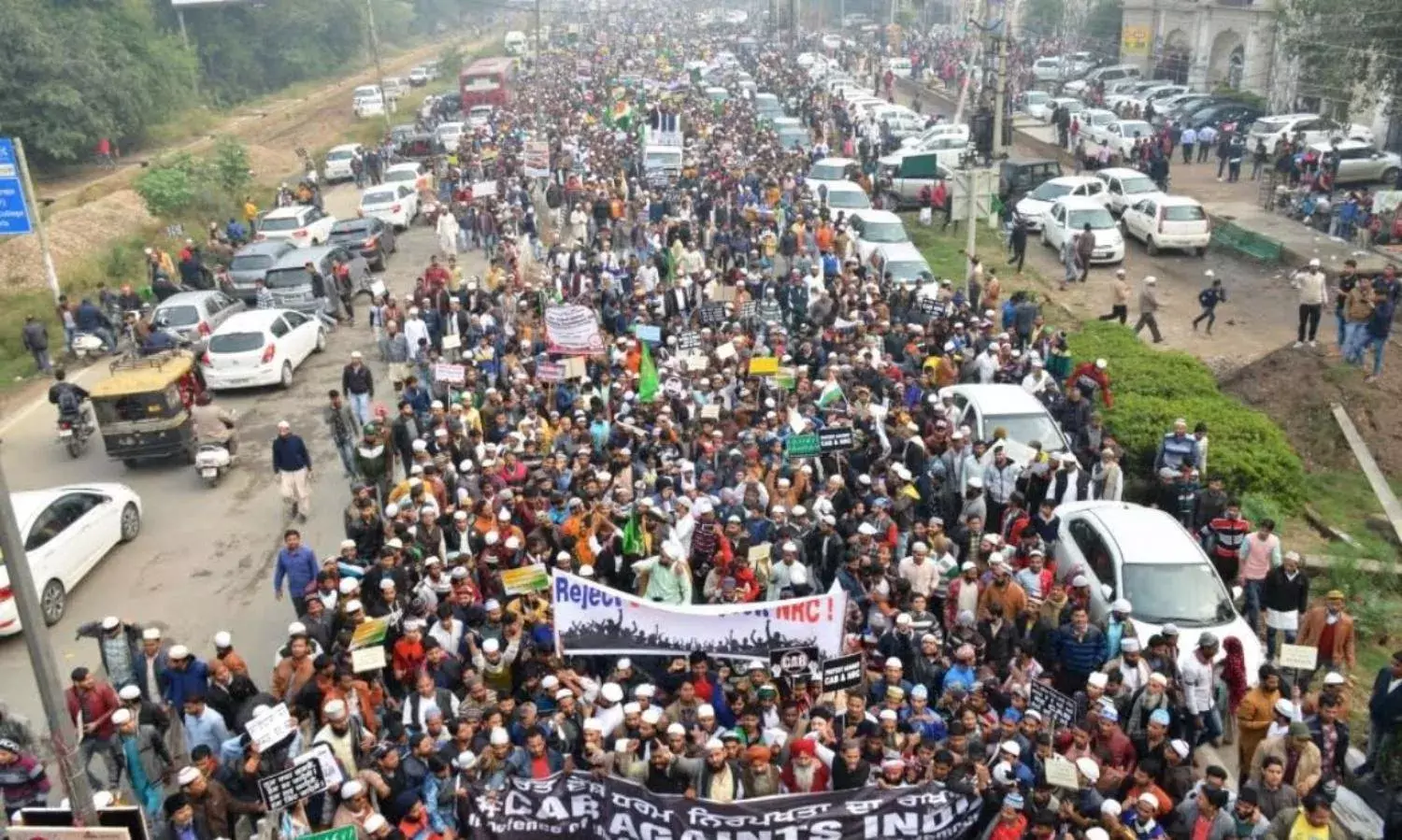Punjab Protests CAB, Big Rallies Across the State
Ludhiana protests today

CHANDIGARH: Tremors of discontent are being felt across Punjab on the issue of Citizen’s Amendment Bill (CAB) passed by Parliament earlier this week. Protests have started in the state and are expected to intensify in the days to come.
Significantly the protests are seeing a sizeable number of Sikhs speaking out against the CAB along with progressive students and civil society organizations. Punjab is a state where a national minority is in majority and geographically it borders Muslim dominated Pakistan. The Sikhs, however, have been protected under the CAB. However, the new Act has clearly invoked memories of Partition with protests despite Chief Minister Amrinder Singh’s initial statement that the CAB will not be implemented in the state.
On December 10, students of Punjabi University at Patiala had started the protests burning copies of the controversial CAB. On Friday, Malerkotla which has since partition remained the only town in Punjab with a sizeable Muslim population saw a complete shutdown. There was a massive protest meeting where people from all the communities participated to oppose the Bill.
On Saturday, there was a massive protest in Ludhiana where again people from all faiths participated. “We had a sizeable participation from the members of Alliance of Sikh Organizations which is an umbrella group of various Sikh groups. There was representation from Khalsa Aid as well as the Dalit organizations in the area. The common sentiment here is that if it is the biggest minority of Muslims that has been targeted this time, tomorrow it could be any other minority that can be target through an amendment. The term ‘Amendment’ is the ‘chor darwaza’ that the Bharatiya Janata Party (BJP) has used. Do you ever write outside a hospital or a police station that members of ‘x’ community can come here and ‘y’ community cannot? The central government needs to be told that the basic structure of the constitution and the democracy cannot be tampered with. People realize that neta ki niyat theek nahin,” Maulana Mohammad Usman Ludhianvi, one of the organizers of the protest, told this reporter.
Rajwinder Meer, a poet who keeps on moving among the masses and intervenes with his poetry on contentious contemporary issues, said that although the common man does not understand the intricacies of CAB he is opposed to its communal character that excludes Muslims. “The general sentiment is that CAB ipart of the process of dividing the people and the country that stopped in 1947. Who can understand the pain of partition and its subsequent violence better than the Punjabis?”
Many observers are of the view that the CAB and the National Register of Citizens (NRC) cannot be seen in isolation. TThere is some confusion whether a state can refuse to implement a central law. Many here are convinced that the ‘dirty game’ of divide and rule is being played to divert attention from the economy that is in a mess.
Professor Manjit Singh who recently retired from Sociology Department of Panjab University told this reporter, “We have to visualize where such things will take us. Has anyone even thought of the fact that Punjab has a sizeable population of migrant labour that has come from other states and how things like CAB and NRC will work in their context? There would be chaos and confusion. It needs to be understood how the CAB and NRC can fracture the organically integrated society.”
“The communal language of CAB says it all in context of the BJP. The government does not realize that such acts can actually strengthen separatist forces,” he added.
“Just because Sikhs are protected under CAB does not mean that we do not understand the intentions of the centre. What is being repeated here is the practice of appeasing one minority community while targeting another. The series of events in the recent past point towards the future of the Indian state. First we had abrogation of Article 370 in Kashmir. Then came a biased verdict on Ayodhya. This has been followed by CAB and then it will be NRC. These are all keys of one chain that is the BJP’s move towards a Hindu Rashtra. And they are going about it in a very fast manner. The CAB has disturbed all the minorities and has instilled insecurity among them. Is there any place in the developed world where asylum seekers are excluded on the basis of their religion,” Dal Khalsa leader Kanwar Pal Singh asked.
He said that the Sikhs have spoken in the past for Kashmiris and will continue to speak out for the Muslims who are being targeted. He said that his organization is supporting the protests and will organize one by itself in the days to come. Dal Khalsa is a group in Punjab known to be practicing radical politics through democratic means.
BJP’s ally, the Shiromani Akali Dal (Badal) that is feeling the heat on the issue in Punjab. Public mood made Akali president Sukhbir Singh Badal take an ambiguous stance on the CAB. Before the bill was passed in Parliament, the party had come out saying that while it welcomed the move of the centre, the Bill should cover all persecuted people irrespective of religion. A statement issued by the party said that keeping in view the country’s socialistic, secular and democratic credentials as well as humanitarian principles Muslims should not be excluded from the Bill on the basis of religion.



